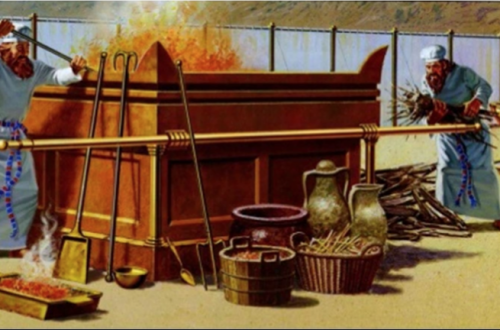The Imperative Wilderness
Leadership is broken because leaders are unbroken
Wilderness Wanderings Series:
Learning to Live the Zigzag Life
The real Jesus
Jesus was real. Radically, totally, absolutely real.
This means He was fully real God and fully real man in the same person.
However, He emptied himself of His divine prerogatives, not of His deity, but of His rights as deity. On the other hand, He filled Himself with human limitations and human needs, yet without sin.
This means He desperately needed the Father and desperately depended on the Holy Spirit. Now some may react to the word desperately, and I understand if they do. I don’t mean desperate as in out of control; I mean desperate as in the deepest need possible…
We must not be afraid to recognize Jesus as human, as one of us. That’s what Christmas is all about; that’s what the early part of Hebrews is all about; that’s what the incarnation is all about.
Jesus fully and totally identified with us. He was not like the father who plays with his children and pretends they are bringing him down to the ground, laughing with great joy that they can take this bigger than life figure down to their level, although both children and father know this is not the case.
The incarnation was not a make believe event for Jesus; it was one of the most real historical events ever. Thus we know that His infancy was real, His growth as a boy was real, His need for prayer was real, His limits were real, His frustrations were real, His testing and temptation were real, His suffering was real, His pain was real, His death was real, and His resurrection was real.
In fact, His testing and temptation not only were real; they were imperative. His testing and temptation is what made the wilderness imperative for Jesus, and if the wilderness was imperative for Him, how can it not be even more imperative for us?
So it was that the Holy Spirit impelled (Mark 1:12) Jesus to go into the wilderness so He could prove Himself as the Messiah. Long after Moses built the tabernacle and Solomon built his temple and Herod built an even greater temple, the wilderness remained God’s original temple, the place where His worshippers went to meet Him in solitude and isolation.
God’s presence made the wilderness holy, but where holiness is, evil is not far away because evil has a compulsive need to combat holiness and seek to replace it with its own destructive desires. As a result, Satan was not far away when Jesus entered the wilderness.
The wilderness was an awful place, the place most impacted by the curse of sin on the physical world, a place full of nothing, just as sin that promises everything, ultimately is full of nothing. It was Jesus with the wild animals prowling and roaring about; Jesus with the angels supporting and encouraging; Jesus with the Holy Spirit enabling and sustaining; Jesus with the Father praying and communing; Jesus with Satan, testing and tempting.
Forty days in solitary isolation without food, forty demanding days that tested Him as Messiah and led to intense temptation. Testing and temptation always go together, and at the end of those forty days, Satan came to tempt Him with three of the greatest leader temptations any of us can experience and all of us feel every day.
The first temptation—turn these stones into bread—was the temptation to self-reliance, to take things into His own hands and meet His needs apart from the Father. It was a temptation to doubt the Father and to act on His own because the Father was not acting quickly enough. In His response, “Man shall not live by bread alone,” Jesus says some things are more important than bread, even after forty days of fasting, and trusting and obeying God is one of those things.
Short cuts to the long way
Short cuts are inevitably long ways on the zigzag line of our wilderness wanderings. Taking control of life and relying on ourselves to meet our needs virtually always results in a forty-year, rather than a forty-day, sojourn in the wilderness. For Jesus it was far more important that He trust the Father’s good will than that He turn to the ill will of the Evil One.
Often we fail to realize that when we take things into our own hands and rely on ourselves, we actually turn to the ill will of the Evil One and reap his tares rather than the Father’s fruit. After all, a starved Messiah is of no use to the Father, even as a failed leader cannot glorify Him. It’s all a matter of trusting Him and fasting a little while longer. By saying no to the self-reliance the Evil One suggested, Jesus trusted His Father and proved Himself worthy of being the Messiah.
For us not to take things into our own hands purifies us of our self-reliant impatience and proves us to be worthy to lead in the name of Jesus.
Take a leap into success
The second temptation—leap off the highest point of the temple into the courtyard below—was the temptation to do the spectacular and gain the success and fame He needed to prove He was Messiah. Few temptations are stronger than the one to take control of success and gain the fame many leaders long to have.
Satan tempted Jesus to do the miraculous to make an impact, the very thing He was sent to do, but not for Himself nor in His own way independent of the Father and the Spirit. Satan tempted Him to succeed by self, not by the Spirit.
What leader among us hasn’t faced that temptation and given into it at one time or another? Those who give in to it realize we lengthen our time in the wilderness and bring an unnecessary zigzag into our lives by seeking our own success rather than waiting for the Father to exalt us His way and in His own will and time.
Spectacular success done in our power inevitably leads to spectacular failure, and our failure lasts a lot longer than our success. It may mean death in the wilderness, as it did for the generation that refused to trust God. Better to endure obscurity in God’s will than burn like a Styrofoam cup in fifteen seconds of self-induced fame.
Do God’s will Satan’s way
The third temptation—rule all the kingdoms of the earth—is irresistible for many of us. For Jesus it was one of the major reasons He came to earth as part of His Father’s ultimate plan for Him. Some day He will rule over all the earth, but it will not be on Satan’s terms or in Satan’s timing. There was only one person He could worship, only one worthy of His worship, even as there is only one who is worthy of our worship.
Because we have no innate power, we try to find it somehow, and we don’t understand that when we turn to ourselves for power, we turn to the powers of earth, not the power of eternity.
While we may not be depending on Satan directly, we are depending on him and his system indirectly when we seek our kingdom, even when we do it in Jesus’ name. That’s what makes power seeking so insidious: apart from dependence on the Father, we draw indirectly on the powers of this age. Thus it was then that Jesus gave Satan His ultimatum: worship God only.
Self, self, self
It was imperative for Jesus to go into the wilderness to be tested, tempted, and proven qualified to be Messiah by overcoming three of the greatest leader temptations we face: self-reliance, self-achievement, and self-empowerment. We also must go into the wilderness to be tested, tempted, and purified, and by this to be proven worthy of being God’s leaders in Christ.
If it was imperative for Jesus to go into the wilderness to demonstrate His credentials as God’s Leader, can it be any less imperative for us? Just be ready. Satan is coming.
From "The Imperative Wilderness" on www.leaderformation.org/blog
 About: The Broken Leadership Blog is about changing the leadership conversation from what we are doing with our hands to what God is doing through our hearts.
About: The Broken Leadership Blog is about changing the leadership conversation from what we are doing with our hands to what God is doing through our hearts.





